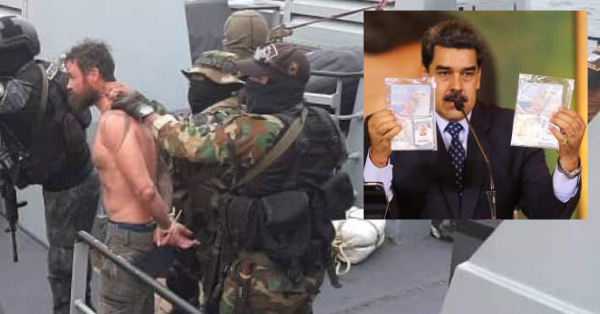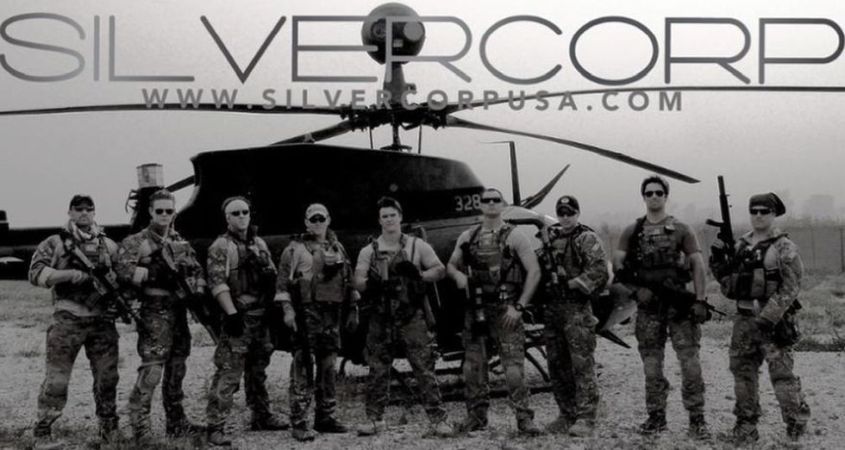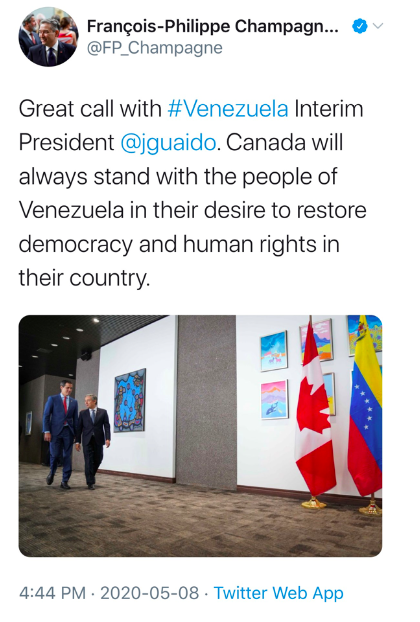The United States has flatly denied any involvement in this putsch, which the plotters dubbed Operation Gideon. "If we had been involved, it would have turned out differently," U.S. Secretary of State Mike Pompeo said on May 6, 2020.
"Whatever it is, we’ll let you know," President Donald Trump had also told reporters on May 5. "But it has nothing to do with our government."
Secretary of Defense Mark Esper
has also denied any U.S. military involvement in the coup attempt. The CIA reportedly
even attempted to convince the group not to go ahead with its plan.
What ever happened?
This CIA's call to abort the attempted coup clearly went unheeded as Operation Gideon, ostensibly an effort to capture Maduro, began on May 1. On that day, a total of 60 men left Colombia in two boats and headed toward the Venezuelan coast near the country's capital Caracas,
according to a statement from Captain Victor Pimenta, a deserter from the Venezuelan military who joined the coup plot and is now in custody in that country.
Pimenta said that one of the two boats, which was carrying Captain Antonio Sequea, another former Venezuelan military officer, and two retired U.S. Army Green Berets,
Airan Berry and Luke Denman, had engine problems, aborted the mission, and attempted to flee to the Dutch island of Bonaire off the coast of Venezuela in the Caribbean Sea. The motor ran out of fuel well before that, forcing them to attempt a landing.
The occupants of both boats were quickly engaged by Venezuelan security forces. Authorities in Venezuela initially claimed that they had killed eight of the raiders, but have since revised that body count
down to six. Another 13 individuals, including Berry and Denman, who were both carrying their U.S. passports and other identifying documents, ended up being captured. The detained Venezuelans were all also carrying ID cards or other means of identification, as well. The status of the rest of the 60-man force is unknown.
Venezuelan authorities also seized vehicles, weapons, and equipment that they captured from the raiders' boats, as well as from a safe house inside the country. There was at least one Ford pickup, along with a pair of Toyotas, all painted black, at the house, the latter two of which were armed with 7.62mm
M240G or FN MAG machine guns. Belts of ammunition were scattered in the trucks' rear beds.
The mercenaries' arsenal included a number of AR-15/M16-type rifles and 100-round
Beta C-Mag drums to go with them. At least 14
Glock pistols and, curiously, at least one Airsoft pellet gun, were also among the weapons that Venezuelan officials captured. It is possible that the airsoft gun was potentially brought to discreetly take out lights.
Unencrypted handheld radios, tablet computers, body armor and helmets, some with American or Venezuelan national flag patches, and
Aoutacc airsoft face masks with a fanged mouth motif meant to be reminiscent of feudal Japanese samurai armor, were among the other items seized.
If the basic details of Operation Gideon seem relatively straightforward, if amateurish and ill-advised, a closer examination of the origins and the execution of the coup attempt are anything but. In fact, in what is perhaps the first and most bizarre element to the story, the Operation Gideon plot had already been public knowledge since May 1, when the
Associated Press published an exclusive expose on what they described as a "failed attempt to oust Venezuela’s Maduro."
That story included on-the-record interviews with former associates of the coup plotters and Venezuelan authorities, who also said their intelligence services had infiltrated the group. Those latter claims are supported by previously unexplained reports of increased security in the areas where the Operation Gideon force ultimately landed.
Jordan Goudreau, another former Green Beret and head of small private security firm Silvercorp USA, who helped organize the coup attempt, declined to give the
Associated Press an interview for that story, but issued a statement refusing to confirm or deny any of the details they had asked him about. This means he knew that story was in the works and that the operation would be compromised, something the coup plotters either disregarded or had forced them to speed up their timetable.
It certainly didn't help the plot's execution that Goudreau publicly announced that it was underway on May 4 in
a now-deleted Tweet that also tagged U.S. President Donald Trump. The retired Green Beret had issued a similar videoed statement on social media while standing alongside Javier Quintero Nieto, a former member of Venezuela's National Guard who was among the coup plot's top leadership.
It's not at all clear what the exact plan was or how it was ever meant to succeed. It's hard to see how the 60-man force, even under the best of circumstances, would have been able to get into downtown Caracas and snatch Maduro, if they even knew where he would be and when.
The
Associated Press did manage to follow up with Gourdreau after Operation Gideon's failure. When asked about why he had sent just 60 men to what is perhaps the most heavily defended part of Venezuela's coastline, the retired American special operator
reminded the reporters about how Alexander the Great had “struck deep into the heart of the enemy" and achieved victory over a numerically superior Persian force at the
Battle of Guagamela in 331.
Where did all of this start?
The
Associated Press' original story said that the plot dated back to at least March 2019, when Keith Schiller, a longtime bodyguard for President Trump, encountered Lester Toledo, met an activist acting as a coordinator for the delivery of humanitarian aid to Venezuela on behalf of opposition leader Juan Guaido, at an event in Washington, D.C. Guaido, with support from the United States and a number of other Latin American countries, had declared himself to be the rightful president of Venezuela in January 2019, following a disputed election and in the midst of years-long economic crisis. This
triggered a still-ongoing political crisis with the Maduro regime, which remains in power with the
backing of Russia and Cuba.
Schiller then brought in Goudreau, who's company, Silvercorp USA, had provided security at Trump rallies in the past, a detail that open-source investigative outlet
Bellingcat uncovered earlier this week. Both Schiller and Goudreau then met with Guaido's representatives in Maimi in May 2019.
Initially, it appeared that Guaido was looking for additional security services to protect the opposition leader at various public rallies to boost support for his cause, something that Silvercorp USA would later provide. A purported contract covering "strategic planning, procuring equipment, and project execution advisement," and worth at least $50 million, and possibly as much as $212 million, between Guaido and Goudreau
is now circulating online. Its authenticity has not been confirmed and it's unclear if it actually referred to anything beyond providing personal protection details.
Regardless, over the course of Silvercorp USA's work with Guaido and his associates, Toledo, the activist, reportedly introduced Goudreau to Cliver Alcala, a retired Venezuelan Army officer who had moved to Colombian 2018 and ran a network of Venezuelan military deserters in camps along the border between the two countries. Among the hundreds of men he supposedly had at his disposal was one involved in a drone assassination attempt against Maduro in 2018, which you can read about in more detail in this
past War Zone piece.
Alcala was and still is a dubious partner in any endeavor. He was involved in the
1992 failed coup attempt that the late Hugo Chavez led against then-Venezuelan President Carlos Andres Perez, was hit
with U.S. sanctions in 2011 for allegedly selling shoulder-fired man-portable surface-to-air missiles, often
referred to by the acronym MANPADS, to the Colombia rebel group FARC in exchange for drugs, and has alleged ties to drug smuggling operations
linked to Maduro and his family.
In March 2020, Alcala
turned himself in to U.S. authorities in Colombia after getting slapped with an indictment over drug trafficking and ending up with a $10 million bounty from the U.S. State Department on his head. There is now also
a $15 million reward out for Maduro on drug-related charges.
The
Associated Press also indicated that Roen Kraft, a member of the famous cheese-making family, may have been involved in at least the early stages of Operation Gideon. However, while Kraft admitted to meeting with Goudreau, he denied involvement in the coup plot or that he ever gave Silvercorp USA any money to help carry it out.
Goudreau has since said that the group was operating on a "
shoestring budget," which aligns with the
Associated Press' almost farcical description of the training camps in Colombia and that story's claim that at least some of the deserters had actually deserted the coup plot, as well. That latter detail was among those that had led the reporters to believe that the entire putsch had collapsed before it even began.
What's going on now?
The failed amphibious raid would, under any normal circumstances, seem to mark the end of this entire debacle. Despite all that has happened so far, Javier Quintero Nieto
told the Miami Herald on May 5, that the group intended to continue on after it regrouped.
"The operations will be halted given that a number of errors were made,” he said. "Definitely, the regime managed to infiltrate people [inside the group] and now we have to reorganize."
Both Nieto and Goudreau have indicated that there are or were sleeper cells inside Venezuela before the raid. This would match up with the Venezuelan government's seizure of the safe house and its contents. Venezuelan security forces are still actively searching for other individuals involved in Operation Gideon.
Everything we know now about Operation Gideon raises questions about a host of other still murky incidents since January 2019. For instance, in February 2019, authorities in Venezuela said they had seized a shipment of weapons aboard a charter flight, an incident that
still remains largely unexplained.
More recently, the Venezuela Navy patrol vessel ANBV
Naiguatá sunk itself after
ramming the ice-capable cruise ship RCGS
Resolute in international waters off the country's coast. The Venezuelan government subsequently claimed that the cruise liner, which reportedly had no passengers and was en route to the Dutch island of Curacao at the time, was involved in the deployment of foreign mercenaries.
Maduro's regime has not offered any hard evidence to support those assertions and experts and observers
rightly noted at the time that rubber rafts present on the ship's deck at the time were not an uncommon sight, with pictures showing members of the crew using them to taking passengers on excursions during past cruises. However, it now seems far more plausible than it did that Venezuelan officials might have actually had intelligence, or at least concerns, that the
Resolute was tied to this plot brewing in neighboring Colombia.
It's also worth remembering that reports had emerged in September 2018 that Trump Administration officials had met with Venezuelan military officers who were
plotting a coup against Maduro. The U.S. government reportedly declined to be involved in that potential putsch, in the end.
A propaganda win for Maduro
As things stand now, it's hard to see how this incident will be anything but a propaganda victory for Maduro's regime. The Venezuelan President and his associates
routinely accuse the United States, as well as Colombia, or plotting
to kill or overthrow him, though no hard evidence is ever provided. While there are no firm indications, as of yet, that the U.S. government was directly involved in this latest plot, it seems clear that it was aware that it was going on and made no efforts to shut it down. It's hard to see how the Colombians would have been unaware, as well, and they also remained indifferent. Whatever the truth of the matter, Maduro now has a very clear incident to point to support his allegations.
Just on May 6, the Venezuelan government released footage of Luke Denman being interrogated and issuing an obviously forced statement about the coup attempt. Denman tells his captor that he wouldn't like it if foreign mercenaries were to launch an operation into the United States to kill President Trump and that he would consider it an act of war. Again, there is no clear indication that Operation Gideon ever planned to kill Maduro or that it had any official U.S. government backing.
It is also almost certain to be an embarrassment for the U.S. government, regardless of its relationship to the plot. Goudreau, as well as Berry and Denman, all served honorably in both Iraq and Afghanistan and were notably
among the Crisis Response Force from the 10th Special Forces Group that flew to Europe in the wake of the
infamous and controversial 2012 terrorist attack on the U.S. consulate in Benghazi, Libya.
Now, as noted, Berry and Denman are in Venezuelan custody and their future is uncertain, but there will definitely be pressure on U.S. authorities to secure their return to the United States. Secretary of State Pompeo has already said that the U.S. government will use "
every tool" to get them back.
Goudreau, with his ties to the Trump Administration and the Trump campaign, is almost certainly in violation of numerous U.S. laws and its hard to see how American authorities could justify not charging him in relation to a coup plot that he has publicly admitted to being a part of. The U.S. government has
reportedly already been investigating Goudreau since March over potential arms smuggling in relationship to the Colombian government seizure of a cache of weapons and accessories that month. Cliver Alcala claimed ownership of that stockpile and might have given up more about the Operation Gideon plot after surrounding himself.
Nieto's claims now that Operation Gideon will continue despite the amphibious raid's failure means that the bizarre saga is unlikely to fade from the public eye in the immediate future. We will just have to wait to see what new and absurd details will come to light as this entire debacle continues to unfold.

 It provided a lot of information to consider.
It provided a lot of information to consider.





